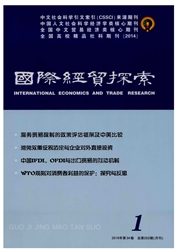

 中文摘要:
中文摘要:
成本是使用或耗费各类资源要素而引起的代价或价值牺牲。形成成本的资源要素具有本质上的有用性、数量上的稀缺性、归属上的产权性和计量上的价值性。导致成本发生的经济资源不仅包括劳动、资本、土地、管理等传统要素,而且包括制度、生态环境、“可持续性”等新兴要素,成本的承担主体可能有企业、政府、社会乃至后人,其他支付方式包括货币或非货币支付、直接或间接支付、自己(本国)或他人(他国)支付等。从本质上说,国际贸易是产权的跨国(或地区)转移,它会通过种种途径和机制影响各国的生产、消费、经济社会制度、资源要素流动、生态环境乃至今人和后人的生活水平,其间发生的成本包括了由生产成本、交易成本、环境成本和代际成本构成的“全成本”。比较优势是国际分工与贸易的基本动因,其本质是对商品成本的相对比较。因此,“全成本”才是形成一国参与国际分工与贸易的比较优势的基础。
 英文摘要:
英文摘要:
Cost is the price or sacrificed value of using or consuming all sorts of resource factors. The resource factors which form the cost have the characteristics of the usefulness in essence, the scarcity in quantity, the property of ownership and the value of measurement. The economic resources leading to cost occurrence not only include the traditional factors such as labor, capital, land, and management, but also include the new factors such as institution, ecological environment and "sustainability". The bearer of the cost can be enterprise, government, society and even future generations, which will be paid by monetary or non-monetary mode, direct or indirect mode, self-pay or others-pay mode, etc. International trade is essentially the trans-national or trans-regional transfer of property rights, and it can influence each country's production, consumption, economic and social institution, the flow of resource factors, ecological environment and the living standard of present and future generations through various pathways and mechanisms. The cost here is "full cost" which includes production cost, transaction cost, environmental cost and inter-generational cost. Comparative advantage is the basic motivation for the international division of labor and international trade, and its essence is the relative comparison of commodity costs. So "full cost" is the foundation of comparative advantages of a country which participates in the international division of labor and international trade.
 同期刊论文项目
同期刊论文项目
 同项目期刊论文
同项目期刊论文
 期刊信息
期刊信息
